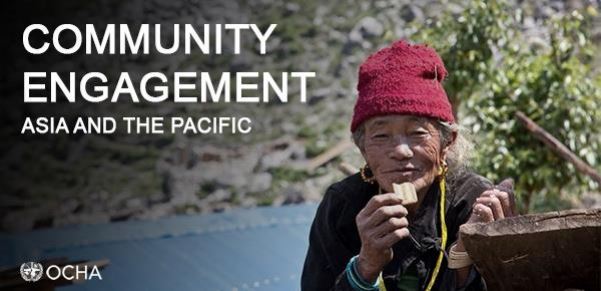
Community Engagement in Humanitarian Action - Experiences from Asia

Convened by the UN Office for the Coordination of Humanitarian Affairs (OCHA), the two day Community Engagement in Humanitarian Action workshop seeks to:
1. Build a regional network of experts interested in supporting innovative approaches to community engagement in humanitarian action.
2. Share case studies and innovative models of good practice such as the common service model.
3. Identify key thematic issues for partners to address in the short to medium term horizon.
4. Develop and agree on how to integrate planning for community engagement into emergency response preparedness processes.
The workshop will adopt a variety of methodologies to ensure full and active participation from workshop participations and presenters. The workshop will create numerous opportunities for participants to engage with and learn about each other, and to build personal and institutional relationships. These opportunities will be both formal (interactive exercises, presentations and guided thematic panel discussions for example) and informal.
Participants will represent UN, INGOs, media development agencies, technology groups, civil society and private sector.
Post-Event ETC Outcomes
The global ETC cell presented its 2020 strategy and facilitated a discussion on ‘community engagement and technology’ at the Asia Community Engagement Workshop in Bangkok (hosted by OCHA) in the first week of October 2016. The workshop was attended by community engagement practitioners from Nepal, Myanmar, Indonesia, the Philippines and Bangladesh, as well as GSMA and the CDAC Network.
Participants shared community engagement projects, successes and challenges on key themes over the two days. Specific ETC support was requested from the Philippines and Nepal (supporting country mapping and a community of practice), which is now being followed up. There is further potential for the ETC to work on government and MNO advocacy to support community engagement efforts in Myanmar, and technical support to preparedness efforts in Bangladesh under the DFID DEPP project umbrella.
These opportunities will be pursued as the global ETC continues to define its approach to country mapping and preparedness. An agreement was reached between the CDAC Network and ETC to incorporate an adjunct ETC training module into the CDAC foundational training for high risk countries, and conversely, for CDAC foundational training content to be incorporated into ETC Services for Communities training.
For more information about ETC Services for Communities, contact: Global.ETC@wfp.org
